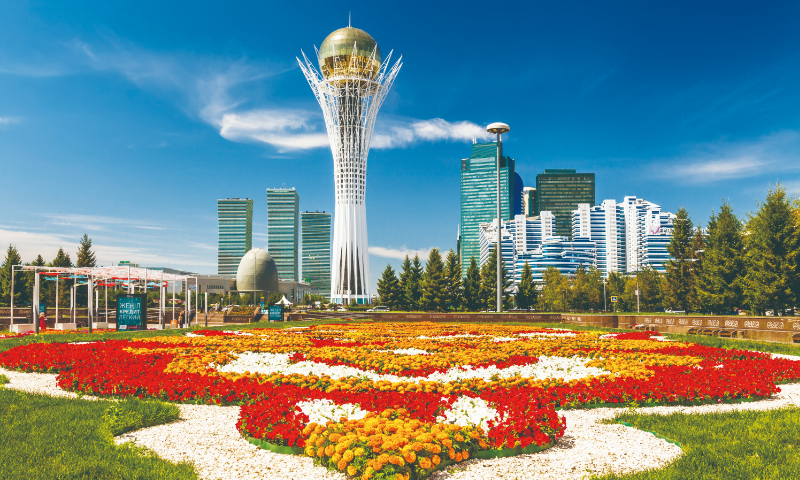
A view of Astana, the capital city of Kazakhstan Photo: VCG
Editor's Note:Amid the 24th Meeting of the Council of Heads of State of the Shanghai Cooperation Organisation (SCO) in Astana, Kazakhstan, the Global Times reporters Li Xuanmin and Xing Xiaojing (
GT) interviewed Aliya Mussabekova (
Mussabekova), chief expert at the Asian Studies Department at Kazakhstan Institute for Strategic Studies under the President of the Republic of Kazakhstan, and Maryam Agharabi (
Agharabi), research coordinator at China & Central Asia Studies Center (CCASC) in Kazakhstan.
The two Kazakh scholars discussed the permanent comprehensive strategic partnership between China and Kazakhstan, which they said is built on the deep-rooted shared vision between the two countries. Also, the SCO, which China and Kazakhstan are founding members, has made significant and consistent contributions to shaping the global agenda of equality and cooperation, they said, adding that the SCO summit in Astana will enhance cooperation on green transition, digital transformation, rare earth exploration as well as the development of the Middle Corridor.

Aliya Mussabekova Photo: Courtesy of Aliya Mussabekova
GT: The 24th meeting of the Council of Heads of State of the Shanghai Cooperation Organization (SCO) is held in Astana, Kazakhstan. From your perspective, how should China and Kazakhstan strengthen cooperation within the SCO framework to maintain regional peace and stability?Mussabekova: The SCO was established to address the challenges of the 21st century. Initially it was a consultative mechanism among five founding states to jointly safeguard regional peace, safety and stability. It has now evolved into one of the largest international structures and a cornerstone of modern global security governance.
China and Kazakhstan, as founding members of the SCO, both take a proactive stance in preserving peace and maintaining stability. At this year's SCO summit, Kazakhstan's leadership will present the SCO Initiative on World Unity for Just Peace and Harmony. This initiative aligns with the Global Security Initiative proposed by China. The synergy reflects universal fundamental principles - security should be comprehensive, cooperative, and indivisible. Sovereignty and territorial integrity must be respected, principles of the UN Charter must be followed, and all issues should be resolved peacefully.
Within the SCO, there's a conceptual understanding of these principles. The SCO has made a significant and consistent contribution to shaping the global agenda of equality and cooperation.
GT: In 2019, China and Kazakhstan decided to develop a permanent comprehensive strategic partnership. How would you evaluate the partnership between China and Kazakhstan?
Mussabekova: Kazakh President Kassym-Jomart Tokayev said that the relations between China and Kazakhstan are actively developing in the spirit of friendship, good neighborliness and eternal strategic partnership.
China also emphasizes the high level and strategic nature of bilateral ties. Kazakhstan was the place where the concept of the Belt and Road Initiative was first proposed in 2013. In 2022, the Chinese leader also made his first overseas trip after the pandemic to Kazakhstan, setting in motion new "golden 30 years" of cooperation.
Currently, relations between our countries have been raised to an unprecedented level - permanent comprehensive strategic partnership. I believe this level emphasizes the historical depth of our relationship - interaction between the civilizations of China and Kazakhstan has a history of more than 2,000 years. During the past years, our relations have developed not only in the field of economy and trade, but there has also been a constant exchange of experiences and cultural communications based on openness, tolerance, and mutual respect. We are confident that looking forward, it will be even more productive and mutually beneficial than the previous one.
Kazakhstan supports China's diplomatic efforts to strengthen regional and international stability. We have endorsed multiple China-proposed initiatives: the Global Development Initiative, the Global Security Initiative, and the Global Civilization Initiative, as well as China's vision to build a community with a shared future for mankind.
For both China and Kazakhstan, it is important not only to maintain but also consistently enhance the positive dynamics of our interaction, deepen the friendship between our people, and contribute to regional peace and stability.
GT: Kazakhstan is the largest economy in Central Asia. From your perspective, what are the highlights of China-Central Asia cooperation?
Mussabekova: The significance of the China-Central Asia cooperation is for everyone to see. Last year, the China-Central Asia Summit took place in Xi'an, Northwest China's Shaanxi Province. It was a landmark event, highlighting our region's growing importance in China's foreign policy. Kazakhstan, accounting for nearly half of Central Asia's trade with China, is keen on furthering this cooperation. The region as a whole is becoming a vital transport and logistics hub, as well as a promising market with substantial human development potential.
GT: In 2013, China proposed the idea of building an "economic belt along the Silk Road" in Kazakhstan, which, combined with the proposal of the 21st Century Maritime Silk Road, eventually became the Belt and Road Initiative (BRI). How do you view the significance of the initiative for the development of Kazakhstan and the Central Asia as a whole?
Mussabekova: Central Asia still remains one of the least interconnected regions in the world. In this regard, the BRI has played a crucial unifying role in Central Asia and has helped it to become a bridge between East and West. I would say, if the community with a shared future for mankind is a broad conceptual framework, a philosophical system of views, and a model of a new world order, then the BRI is the driver of the new world order, with its economic and logistical backbone.
China, Kyrgyzstan and Uzbekistan have officially signed an intergovernmental agreement in Beijing to build the China-Kyrgyzstan-Uzbekistan railway project. It is an important BRI infrastructure project. The most priority projects in the Central Asia region are joint development projects in trade and logistics, industrial cooperation and energy. These projects, both of a large regional scale and of local importance, are the foundation of a self-sufficient and protected common market, and in the long term the basis for the prosperity of Central Asia as a region.
GT: Could you share your insights on the development of people-to-people exchanges between China and Kazakhstan in recent years?
Mussabekova: This year marks the China-Kazakhstan Tourism Year, and Chinese tourists are particularly interested in Kazakhstan's historical and natural sites. These include the Mausoleum of Khoja Ahmed Yasawi in Turkestan, the city of Almaty and Charyn Canyon, the city of Aktau and the nature reserves in the Mangystau region, and, of course, the capital city of Astana.
Currently, there are plans to increase direct flights between the two countries to 30 regular flights per week. This capacity is still insufficient. Additionally, for the first time, an "open skies" policy is being introduced between Kazakhstan and China. Only a few countries have been granted with the right with regards to operating flight to China, and now Kazakhstan is among them.
It has also been announced that an international passenger train will be launched from Xi'an to Almaty. Pay attention to the route - the train will pass through the most scenic areas of western China and eastern Kazakhstan.
Meanwhile, the "Chinese language craze" and "Chinese culture craze" have certainly been continuously heating up in Kazakhstan, especially in the last couple of years. I'm studying at Confucius Institute in Kazakhstan, which is an amazing place. We not only learn the language, but also get acquainted with Chinese culture, and watch films about China. We had a Chinese calligraphy lesson, and we even went with a group to the best Chinese restaurant in Astana to get to know Chinese cuisine better.
From my own experience, studying Chinese is now of interest to both children and adults, even the pensioners. For Kazakhs, China is considered one of the best destinations for education, and for Kazakhstani schoolchildren, it is prestigious to be accepted by Chinese universities. In the field of technical training, since last year, the "Luban Workshop" project has been opening in Oskemen in eastern Kazakhstan.





